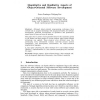Free Online Productivity Tools
i2Speak
i2Symbol
i2OCR
iTex2Img
iWeb2Print
iWeb2Shot
i2Type
iPdf2Split
iPdf2Merge
i2Bopomofo
i2Arabic
i2Style
i2Image
i2PDF
iLatex2Rtf
Sci2ools
121
click to vote
ISOOMS
1994
1994
Quantitative and Qualitative Aspects of Object-Oriented Software Development
Although object-oriented programming techniques have evolved into an accepted technology with recognized benefits for software development, profound investigations of qualitative and quantitative aspects about its pros and cons are missing. This paper tries to answer crucial questions based on the experience gained by the authors and their partners in several projects where object-oriented technology was applied. These projects cover different areas like prototyping tools, information systems, real-time process control components, and development environments for object-oriented programming languages. A case study comparing the object-oriented (C++) and module-oriented (Modula-2) implementation of a user interface prototyping tool concludes this paper. Keywords. Design patterns, object-oriented design, object-oriented software development, application frameworks, class libraries, reusability
ISOOMS 1994 | Object-oriented | Object-oriented Programming | Object-oriented Programming Techniques | Programming Languages |
Related Content
| Added | 10 Aug 2010 |
| Updated | 10 Aug 2010 |
| Type | Conference |
| Year | 1994 |
| Where | ISOOMS |
| Authors | Gustav Pomberger, Wolfgang Pree |
Comments (0)

